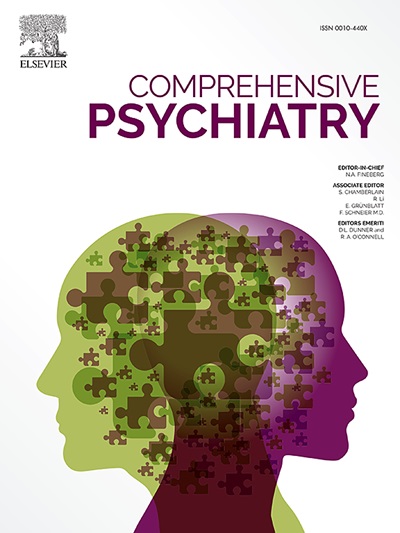Adapting the group traumatic episode protocol approach as a paraprofessional-led early intervention for law enforcement personnel
IF 4.2
2区 医学
Q1 PSYCHIATRY
引用次数: 0
Abstract
Background
Law enforcement personnel experience high levels of occupational stress and frequent exposure to potentially traumatic events, requiring effective early interventions. The Modified Group Traumatic Episode Protocol (mGTEP) is an adaptation of Eye Movement Desensitization and Reprocessing (EMDR) designed to help individuals process traumatic experiences in a group setting. This study evaluated the feasibility and effectiveness of a paraprofessional-led mGTEP within the law enforcement population.
Methods
Police officers and staff, with peer support background, were trained as paraprofessionals to facilitate mGTEP as early mental health support for their colleagues. Their role bridges the gap between informal peer support and professional mental health services. Psychological distress (single-item scale), depression (PHQ-9), anxiety (GAD-7), and trauma-related stress (PCL-5) were assessed at baseline (T1), post-intervention (T2), and follow-up (T3). Multilevel statistical analyses were conducted to evaluate changes over time. A sample of 40 law enforcement personnel participated in online mGTEP sessions. The sample consisted of mostly males (54 %), ranging from age 28 to 53 with an average of 14 years working in the police. Multilevel modelling was applied to the repeated measures design to analyse changes across three time points, combining both random (e.g., participant) and fixed (e.g., time) effects.
Results
Significant reductions were observed from T1 to T2 in distress (d = 0.69, large), anxiety (d = 0.65, large), and trauma-related stress (d = 0.48, medium), with sustained improvements in depression (d = 0.26, small) and trauma-related stress (d = 0.48, medium) at follow-up. Anxiety scores slightly increased between T2 and T3 (d = 0.36, small). Similarly, distress scores did not continue to decline beyond T2. These results potentially reflect the ongoing demands of policing and continued exposure to trauma.
Conclusion
This study highlights the feasibility of mGTEP as a paraprofessional-led early intervention for law enforcement personnel, demonstrating significant symptom reductions. While improvements in depression and trauma-related stress persisted, fluctuations in anxiety and distress levels suggest the need for continued support post-intervention. Given the cumulative nature of occupational stress in policing, regular implementation may be necessary to sustain benefits. Integrating mGTEP into existing mental health programs could enhance accessibility, allowing it to complement other psychological support initiatives.
调整团体创伤事件协议方法,作为执法人员的一种以准专业人员为主导的早期干预
执法人员面临高度的职业压力,经常暴露于潜在的创伤性事件,需要有效的早期干预。修改的群体创伤事件协议(mGTEP)是眼动脱敏和再处理(EMDR)的改编,旨在帮助个人在群体环境中处理创伤经历。本研究评估了在执法人员中以专业人员为主导的mGTEP的可行性和有效性。方法对具有同伴支持背景的警察和工作人员进行辅助专业人员培训,以促进mGTEP为其同事提供早期心理健康支持。他们的作用弥补了非正式同伴支持和专业精神卫生服务之间的差距。在基线(T1)、干预后(T2)和随访(T3)评估心理困扰(单项量表)、抑郁(PHQ-9)、焦虑(GAD-7)和创伤相关应激(PCL-5)。进行了多水平统计分析,以评估随时间的变化。40名执法人员参加了在线mGTEP会议。样本主要由男性组成(54%),年龄从28岁到53岁,平均在警察部门工作14年。多层次建模应用于重复测量设计,以分析三个时间点的变化,结合随机(例如,参与者)和固定(例如,时间)效应。结果从T1到T2,抑郁(d = 0.69,大)、焦虑(d = 0.65,大)和创伤相关应激(d = 0.48,中)显著降低,随访时抑郁(d = 0.26,小)和创伤相关应激(d = 0.48,中)持续改善。焦虑评分在T2和T3之间略有升高(d = 0.36,小)。同样,痛苦评分在T2之后也没有继续下降。这些结果可能反映了持续的警务需求和持续的创伤暴露。结论:本研究强调了mGTEP作为一种辅助专业人员主导的执法人员早期干预的可行性,显示出显著的症状减轻。虽然抑郁和与创伤有关的压力持续得到改善,但焦虑和痛苦程度的波动表明,干预后需要继续得到支持。鉴于警务工作中职业压力的累积性,定期实施可能是维持福利的必要条件。将mGTEP纳入现有的心理健康计划可以提高可及性,使其成为其他心理支持计划的补充。
本文章由计算机程序翻译,如有差异,请以英文原文为准。
求助全文
约1分钟内获得全文
求助全文
来源期刊

Comprehensive psychiatry
医学-精神病学
CiteScore
12.50
自引率
1.40%
发文量
64
审稿时长
29 days
期刊介绍:
"Comprehensive Psychiatry" is an open access, peer-reviewed journal dedicated to the field of psychiatry and mental health. Its primary mission is to share the latest advancements in knowledge to enhance patient care and deepen the understanding of mental illnesses. The journal is supported by a diverse team of international editors and peer reviewers, ensuring the publication of high-quality research with a strong focus on clinical relevance and the implications for psychopathology.
"Comprehensive Psychiatry" encourages authors to present their research in an accessible manner, facilitating engagement with clinicians, policymakers, and the broader public. By embracing an open access policy, the journal aims to maximize the global impact of its content, making it readily available to a wide audience and fostering scientific collaboration and public awareness beyond the traditional academic community. This approach is designed to promote a more inclusive and informed dialogue on mental health, contributing to the overall progress in the field.
 求助内容:
求助内容: 应助结果提醒方式:
应助结果提醒方式:


